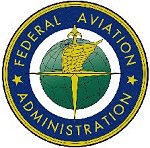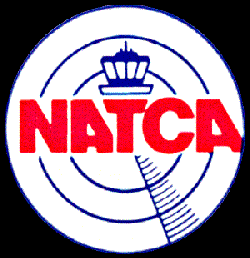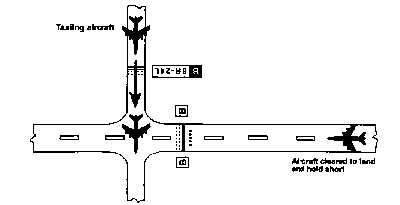We Ran the Union's Side Yesterday
 It's not too often that we get mail
jumping to the defense of the FAA, but once in a while an FAA-er
gets just about enough, and lets us have it. Though yesterday's
story clearly originated with the NATCA (controllers') union, one
reader thought we needed to give the FAA a chance to explain stuff.
Here's a bit of what he wrote:
It's not too often that we get mail
jumping to the defense of the FAA, but once in a while an FAA-er
gets just about enough, and lets us have it. Though yesterday's
story clearly originated with the NATCA (controllers') union, one
reader thought we needed to give the FAA a chance to explain stuff.
Here's a bit of what he wrote:
"You guys blew it on the Chicago TRACON (it's a
money issue) this a.m... No mention that you tried to call anyone,
and we are accused all over the story with nary an opportunity to
participate..."
OK -- we called Tony Molinaro at the FAA's office near Chicago
[their voice mail was down when we did the first installment,
though we didn't know that], and he explained a bit more. He
couldn't cover everything with which he disagreed, he told us,
because, "They threw so much in there."
 For instance, "They talked about staffing
levels. We are at 96% of the agreed-upon levels (agreed-upon
between FAA and NATCA). We continue to hire, and we continue to
train. If it [the agreement] needs to be changed, NATCA needs to
get together with the FAA."
For instance, "They talked about staffing
levels. We are at 96% of the agreed-upon levels (agreed-upon
between FAA and NATCA). We continue to hire, and we continue to
train. If it [the agreement] needs to be changed, NATCA needs to
get together with the FAA."
'Retirement' Scare Overblown
Mr. Molinaro explained that the union's mention of a possible
meltdown of the ATC system, as controllers reach retirement age,
might have been missing some key points. "Just because a controller
could retire at age 56," Tony told us, "that doesn't mean they
will." He wasn't at his desk when we caught him, and didn't have
the exact number in his head, but he noted, "Mandatory retirement
comes at age 60 or 62," and he took an educated guess and said he
thought, "about 70% of controllers stay until they hit mandatory
retirement." Even though Molinaro's figures are 'back-of-envelope,
we understood the point: reaching minimum retirement age isn't the
same as actually retiring.
It's about the money?
 The union, he seemed to
be saying, is probably invoking the 'safety' card in order to get
some public support for its request for more money. 'Chicago' isn't
just one city -- it's huge, and the living costs vary, from one
area or facility, to another. With facilities in Elgin, Aurora, and
Chicago all coming up as different cost-of-living centers in the
government's computers, the Elgin (TRACON) folks, who are in the
'low-rent district' feel that they need more money, to attract the
controllers they know they'll need. Molinaro said, "They would like
more incentives to get more controllers to go to the Chicago
TRACON. That would take more money." How much are they making now?
Typical-tenure controllers, Molinaro said, are, "...making on
average $75-$100,000 a year," roughly the same as in, for example,
"NY, Houston, and San Francisco."
The union, he seemed to
be saying, is probably invoking the 'safety' card in order to get
some public support for its request for more money. 'Chicago' isn't
just one city -- it's huge, and the living costs vary, from one
area or facility, to another. With facilities in Elgin, Aurora, and
Chicago all coming up as different cost-of-living centers in the
government's computers, the Elgin (TRACON) folks, who are in the
'low-rent district' feel that they need more money, to attract the
controllers they know they'll need. Molinaro said, "They would like
more incentives to get more controllers to go to the Chicago
TRACON. That would take more money." How much are they making now?
Typical-tenure controllers, Molinaro said, are, "...making on
average $75-$100,000 a year," roughly the same as in, for example,
"NY, Houston, and San Francisco."
Here's the deal: "You make less at the TRACON than at the tower
or the control center," he explained. "It's because government
(outside the FAA's control) determines that Elgin (location of the
TRACON) is different from the city, proper. They're looking for
more money; we're looking at that issue. We're working on the
budget for the entire FAA."
About claims of 'extra work' related to LAHSO:
Land and Hold Short Operations, designed to help ease congestion
at crowded airports, requires coordination among pilots and
controllers. In each operation, our FAA man near Chicago
explained, there's an "active" and a "passive" pilot. The "active"
pilot is doing the actual holding; the "passive" pilot is the one
getting the quick trip off the runway. Until recently, only the
"active" pilot had to be specially-trained; the "passive" pilot,
since he wasn't really doing anything special, did not require
the training.

That has changed; now both pilots need the training, for the
operation to commence. Here's the contention: only US-carrier
pilots, with spotty exceptions, have LAHSO training. That
means, for O'Hare, that, when LAHSO ops are invoked, only
US-carrier pilots can be involved, as either "active" or
"passive." Although that sounds like a major headache, Molinaro
says it's not quite that bad: "When that could occur, we've lowered
the arrival rate, so the complexity doesn't affect anything."
There's one other thing he wanted us to pass along: "Of course,
LAHSO is only employed in good weather."
Anyway, we hope your understanding is now more-comprehensive.
Stay tuned -- this won't end here.
 NTSB Prelim: Sikorsky UH60 Sikorsky UH-60
NTSB Prelim: Sikorsky UH60 Sikorsky UH-60 Aero-News: Quote of the Day (11.13.25)
Aero-News: Quote of the Day (11.13.25) ANN's Daily Aero-Term (11.13.25): Ground Clutter
ANN's Daily Aero-Term (11.13.25): Ground Clutter ANN's Daily Aero-Linx (11.13.25)
ANN's Daily Aero-Linx (11.13.25) Airborne 11.07.25: Affordable Expo Starts!, Duffy Worries, Isaacman!
Airborne 11.07.25: Affordable Expo Starts!, Duffy Worries, Isaacman!






